- Home
- Alex Archer
The Pretender's Gambit Page 11
The Pretender's Gambit Read online
Page 11
Annja quickly scanned through the information she’d gotten on the man. Onoprienko had a long history of violence. He’d only gotten out of prison a few weeks ago. If Klykov was correct in his assumption, and she felt that he was, Onoprienko would be headed back to prison.
“Do you know where Onoprienko is?”
Klykov shrugged. “I can make a few calls, if you would like.”
Annja didn’t hesitate. “Please.” She only briefly considered calling Bart and telling him what she was doing, but she had the definite feeling that Klykov would not cooperate with the police no matter how much television swag was offered.
And there was a chance that Onoprienko was not guilty no matter what Klykov said. Calling Bart, until she knew for certain, would only deflect the ongoing investigation.
Klykov took out his cell phone and started punching in numbers.
* * *
SITTING IN A tiny cybercafe across the street from the bar he had tracked Annja Creed to, Rao sipped hot tea and waited. He had gotten lucky when he’d returned to the apartment building where Benyovszky had lived. If the archaeologist had not been there, he hadn’t known what he was going to do. She was his closest lead to the elephant.
But she had been there, and he had tracked her to the building where the fortune-teller lived. Now she was across the street. Rao didn’t know who she was talking to, but he knew the woman had not given up on finding the elephant. The fact built up his confidence at the same time as it filled him with trepidation. He needed to pick up the elephant’s trail himself and find out if the legends about the Eye of Vishnu were correct.
Even if they weren’t, even if the power of the eye wasn’t real, there could still yet be so much recovered that had been thought lost.
“Hey, bro. You got any change you could donate to a worthy cause?”
Rao turned toward the three young men that approached him. He had marked the three of them when they’d entered the cybercafe and had known they could pose trouble. He’d made certain he never had eye contact with them, choosing to remain quiet and small.
The tactic hadn’t worked primarily because there were so few people in the cybercafe. All of the other clientele were teenagers playing computer games.
There was no “worthy” cause. The men were there to rob him.
“I think I can help you.” Rao reached into his pocket and took out twenty-three dollars, all that he had left when a man had tried to mug him earlier. After he had knocked the would-be mugger out, Rao had taken the man’s clothes as well, switching the unconscious man out with the orange jail jumpsuit. Rao placed the money on the table before him.
Money didn’t concern Rao. Finances were the least of his worries with the temple behind him.
The tallest of the three men picked up the folded bills and flipped through them. As he totaled the amount, his lips moved. “Twenty-three bucks, that’s it?” He didn’t sound happy.
“It is all I have,” Rao said truthfully. He hoped they would believe him and leave him in peace. He did not want to give up his observation post.
The man squinted at Rao doubtfully. “I don’t think this money is all you have. You’re holding out on us, man, and we don’t like that.”
“I have no more money. Please take that and go.”
At the check-in counter, the clerk watched anxiously as he stood with his cell phone clutched in one hand. He was in his middle years, shaggy headed and wearing a heavy-metal T-shirt with the name of a band that Rao was familiar with from his days at university.
“Can’t do it, ” the tall gang member said. “This ain’t enough to even get us some burgers.”
“If I had more, I would give it to you.”
“Let’s see if that’s true. Stand up and lemme see.” The young man waved a hand at Rao.
Without a word, Rao stood. His clothing didn’t fit him properly. The shirt and jacket were too big, and the pants were too short, ending a few inches above his ankles.
“Empty your pockets.” The gang member waited as Rao did as ordered, turning up only a few coins.
“I ain’t believing it,” one of the other men said. “Guy’s gotta be hanging on to something. Nobody walks around that broke that ain’t got a credit card on them.”
The leader nodded. “That’s true. And why don’t you have any ID?”
Not having ID was going to be a problem. Rao knew he would have to contact the temple to work that out. He intended to do that as soon as he pieced together what Annja Creed was doing.
“It was stolen,” Rao replied. “This city is not a good place to live.”
The men laughed at that.
The guy leading the group stepped forward and seized Rao’s wrist. Rao let the man twist the arm behind him, but could not bear having the man put his dirty hands on him. Knowing precisely where the big man was by his stance and the way he held himself, Rao twisted out of the hold, caught a new one on the man’s arm, then chopped the man in the throat.
The man staggered back, reaching for his throat and panicking because he couldn’t breathe. The temporary throat paralysis would pass, but Rao didn’t want to wait for that. He dropped to his hands and swept the man’s legs out from under him with a foot. Then he rolled away and got to his feet in one lithe move.
His two companions tried to close ranks, slipping knives into their hands as they fell into striking stances. Rao dropped into a Crane stance, both his hands moving before him. The men hesitated, then rushed in.
Rao slapped the first man’s knife hand away with the back of his wrist and slammed a palm strike to his opponent’s chest. While the man struggled to catch his breath, Rao plucked the knife from his hand and spun behind the second man, who had overextended himself on his thrust.
Flicking the knife out, Rao fended off the man’s second thrust with the blade. Metal screamed and hissed as the knives met. Holding the man’s weapon at bay with his own, Rao lifted his left leg and drove his foot into the man’s face, driving him backward into another table.
The man fell on top of the table and tried to get up. Rao reversed the knife and whipped it down. The point nicked the man’s earlobe and nailed his hood to the table. Frightened, probably thinking he’d been stabbed, the man lay there and blinked rapidly.
Rao leaned over the man, invading his space. “Stay here.”
The man nodded.
Calmly, Rao pulled up the hood of his own jacket, reclaimed his money from the first man, who was still struggling for his breath while lying on the floor, and left the cybercafe. The café manager was talking rapidly on his phone.
Outside the café, Rao searched for another position that would allow him to observe the Russian bar when he noticed Annja Creed leaving the building.
Two old men walked with her to a cab. A younger man, obviously not happy with the situation, followed them, but one of the old men waved him away. Like a sullen pup, the young man walked back to the door of the bar and stood there with his hands folded up under his arms.
Spotting another cab coming down the street, Rao flagged the driver. He opened the rear door and slid into the backseat.
“Where to?” the driver asked.
Rao rolled his window down a little to allow fresh air into the vehicle. He nodded at the cab just pulling away from the curb in front of the Russian bar. “Follow that car.”
Without missing a beat, the cab driver reached over, flicked on the meter and eased into traffic.
“Do not lose them,” Rao said.
Chapter 13
The party aboard the yacht was winding down into drunken debauchery as Sequeira knew it would. These things always ended like this once enough alcohol had been poured into his guests. Most of them had already left, taking small transport boats back to the coast. Only a few would stay over on the boat. The
y would be witnesses if Sequeira ever needed them.
He sat out on the deck with a bottle of wine, a Cuban cigar and the old journal that had set him on to the trail of the elephant as the sun sank slowly into the sea to the west. He’d bought the journal three years ago from an online artifact dealer who had already had the original manuscript translated. Sequeira had a translation on the iPad that lay on the table next to the bottle of wine. He had been going back and forth between the two, smoking, drinking and dreaming of where it all might lead.
If he could only find the elephant.
Over the years, Sequeira had chased a few myths and legends. That had been how he had found the Spanish ship, and a few other caches of gold and gems in Europe and in West Africa. He lived for the excitement of finding more. There was no other drug like that of discovery.
His father had recognized that, too. While he’d only been in the beginning stages of his sickness, Sequeira had brought his father out to the shipwreck, had let him hold the treasure they had hauled up from the sea floor. His father had laughed and celebrated and gotten drunk. It had been the first time Sequeira had seen the old man act like a young man, and it had made him realize what he had missed in not truly getting to know his father.
Although he had the translation on his iPad, Sequeira preferred to turn the pages of the journal. The hardbound book felt old and smelled of smoke and spices and of the leather that covered the shaved wooden boards that bound it. Some of the pages were faded almost to the point that the ink had disappeared. Those pages had been chemically recovered, reconstituted and translated.
Mostly the journal was filled with boring, everyday things. The journal’s author had been, according to his narrative, one of Catherine the Great’s many lovers. He had also been an Austrian spy for the Ottoman Empire, which had battled Russian expansion many times and again in 1787 to 1791.
The author, Raimund Klimt, had presented himself as a scholar, a man of letters who intended to write a history of the great queen. Their love affair had been brief. Catherine had told Klimt that he wasn’t very skilled, while Klimt argued that the queen was an insatiable beast. But she had set him up with an allowance and he had remained in Russia. Together with the stipend Klimt got for spying for the Turks, he did quite well for himself.
While in Catherine’s courts, he had been there the day the elephant was brought to Russia from Japan.
Sequeira sipped his wine and flicked ash from his cigar as he studied the pages where Klimt had written about the elephant. Although he couldn’t read the Austrian’s handwriting, Sequeira knew what it said.
It was such a small gift, actually. No more than a trifle. I was, quite frankly underwhelmed by the cheapness of the gesture. After all, Queen Catherine had spared no expense to return those Japanese sailors to their homeland.
Over the years, Sequeira had learned of the ill-fated Japanese ship that had gone down in the Aleutians, and of their rescue—more or less—by Russian traders. Catherine the Great had spared no expense returning the Japanese survivors home because she’d hoped to open up trade to Japan, which had been closed off to the outer world at the time. In that, the infamous queen had been successful.
On the next page, Klimt had sketched a likeness of the elephant. There were several other sketches in the journal, most of them of the queen—including a few nudes that alone had driven up the price of the journal—and of the Russian court and the nobility.
Only one other entry had referred to the elephant. Klimt had gone drinking with the ship’s captain that had brought the Japanese gifts back to the queen.
From what the fellow said, you would have thought the little elephant statue was legendary. Captain Musatov, himself a very intelligent man who spoke Mandarin, told me that the men who gave him the elephant insisted that it led to some forgotten past and was reputed to lead to a mystical legend involving a godlike power.
I asked him if he believed in such a thing. Captain Musatov laughed at me and told me that more than likely the pretty story the Japanese painted of the elephant was there only to serve as decoration for the piece, to give it value. There were many other items that the Japanese sent that intrigued Queen Catherine much more.
The next few pages included an inventory of those items as well as a few more sketches. They were mostly spices, robes, ornamental fans and furniture. The queen had been most taken with the robes, but only for a short time. She’d been in the middle of the second war with the Ottoman Empire, which she had won.
Sequeira stared at the image of the elephant. It was small, no more than five or six inches tall, and had been seemingly made of everyday stone. There had been no clues or ciphers described anywhere on it. Looking at it now made him want it even more.
One of the two burner phones on the table rang and the viewscreen showed a New York number. Sequeira had been waiting on the call for hours. One of his telecommunications companies manufactured the disposable phones and he always kept several of them on hand. He scooped up the device and answered.
“Yes?”
“It has been done.” The lawyer on the other end of the phone was American, a man Sequeira had used before when negotiating legitimate business dealings in the United States. Most of the lawyer’s work was in the realm of intellectual properties, but he had friends who were lawyers who worked in other fields. He did not use Sequeira’s name. They never used names on the phone.
“They are free?”
“Yes. Only just. I doubt they cleared the building where they were being held before I called the other party.”
“Good. Thank you.” Sequeira broke the connection, took the phone apart and tossed the pieces over the side of the ship into the ocean.
The other party was quite possibly the most dangerous person Sequeira had ever known. Restrepo was only a few years younger than Sequeira. Born in Bogota, Restrepo had become an assassin for the cocaine cartels, and had left Colombia when the American DEA forces had closed in and shut down drug operations in that area. Better still, Restrepo had escaped before anyone could get a picture or fingerprints into any kind of tracking program.
The assassin was called Brisa, which translated into breeze, like a gust of wind. Brisa was called that because the assassin came and went with impunity, just like a breeze. Only when Brisa left a place, dead men littered the location.
Sequeira had found Brisa on the beach. Brisa had been living hand to mouth as a contract killer, working through an accountant in Lisbon who was a distant relative. The accountant also handled some of Sequeira’s business. When a bit of business came up that couldn’t be handled by cooking the books and it would be better if a witness disappeared, the accountant had recommended Brisa.
After that first kill, done so neatly and so quietly, Sequeira had put the assassin on his invisible payroll. Even Adrian Sequeira had been impressed by Brisa.
Sequeira closed the journal and placed it atop his iPad. He sipped his wine and smoked his cigar, dreaming of the time he would get his hands on the elephant. And he waited on Brisa’s call. That would come in on the second burner phone, and Sequeira knew he wouldn’t have to wait long.
Brisa was quick and efficient. Always.
* * *
TIRED AND NERVOUS, knowing that he had been fortunate to be released from the American police, Calapez hurried down the steps leading from the police station where he’d been kept. Since his arrest, he’d been moved twice to different places. He didn’t know if that was to confuse h
im or to put anyone who tried to follow him off his trail.
“Can we get something to eat?” Pousao matched Calapez’s stride.
“Later. The first thing we do is get out of this city.” Calapez turned up his jacket collar against the chill.
“Why? The lawyer said we were free to go.”
“This is America. We were arrested by New York City police officers. The next thing you know, we will be arrested by Homeland Security, and there is no getting away from them.”
“If you have enough money, you can get away from anyone. The man we work for has plenty of money.” Pousao was clever enough not to mention Sequeira’s name in public.
Calapez made no reply. Pousao was young and did not know as much about the world as he wished to believe. The police could arrest them once more, that was true, but Calapez was more afraid of what Sequeira would do. Their employer did not like to brush up against the law and did not allow any ties to him regarding an illegal activity.
The man Calapez had killed was a definite liability. There was no statute of limitations on murder in the United States. If that murder was ever solved, the police could come after Sequeira as well as Calapez and Pousao. Sequeira might not know about the murder. Calapez hoped not. He chided himself for not simply tying the man up, but he had been angry that his assignment had turned difficult, and that anger had needed to be let out.
Walking with long strides, Calapez almost fled down the sidewalk through the thronging afternoon crowd. A street vendor offering hot dogs stood at the corner and called out his wares.
“Please. Something to eat.” Pousao sounded pathetic, almost like a child. How he could be so professional on the job and be like this now, Calapez could not understand. “We can eat as we walk. Do you even know where you’re—”

 Rogue Angel: Forbidden City
Rogue Angel: Forbidden City The Spider Stone
The Spider Stone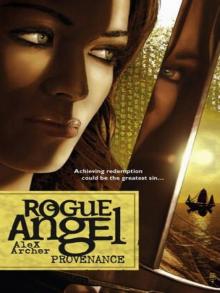 Provenance
Provenance Blood Cursed
Blood Cursed Fury's Goddess
Fury's Goddess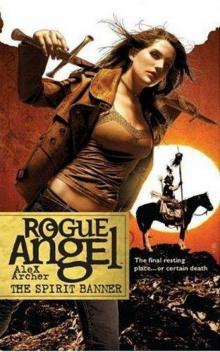 The Spirit Banner
The Spirit Banner Footprints
Footprints The Pretender's Gambit
The Pretender's Gambit Rogue Angel: The Lost Scrolls
Rogue Angel: The Lost Scrolls Staff of Judea
Staff of Judea Rogue Angel 55: Beneath Still Waters
Rogue Angel 55: Beneath Still Waters The Mortality Principle
The Mortality Principle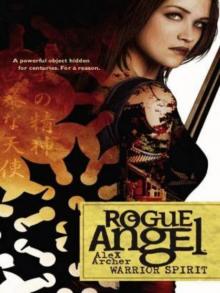 Warrior Spirit
Warrior Spirit Paradox
Paradox Tear of the Gods
Tear of the Gods Forbidden City
Forbidden City River of Nightmares (Rogue Angel)
River of Nightmares (Rogue Angel) Rogue Angel: The Secret of the Slaves
Rogue Angel: The Secret of the Slaves Destiny
Destiny Rogue Angel 51: The Pretender's Gambit
Rogue Angel 51: The Pretender's Gambit Celtic Fire
Celtic Fire Rogue Angel 54: Day of Atonement
Rogue Angel 54: Day of Atonement Day of Atonement
Day of Atonement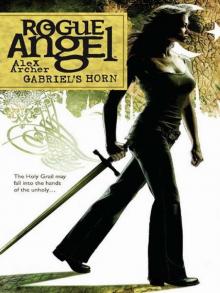 Rogue Angel: Gabriel's Horn
Rogue Angel: Gabriel's Horn Grendel's Curse
Grendel's Curse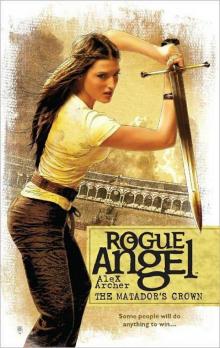 The Matador's Crown
The Matador's Crown Rogue Angel: The Chosen
Rogue Angel: The Chosen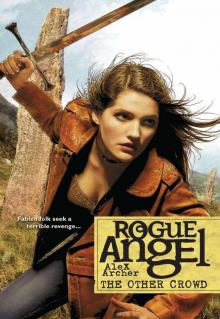 The Other Crowd
The Other Crowd Seeker’s Curse
Seeker’s Curse Rogue Angel 52: Death Mask
Rogue Angel 52: Death Mask The Golden Elephant
The Golden Elephant Blood Cursed (Rogue Angel)
Blood Cursed (Rogue Angel) Celtic Fire (Rogue Angel)
Celtic Fire (Rogue Angel)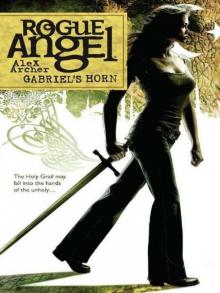 Gabriel's Horn
Gabriel's Horn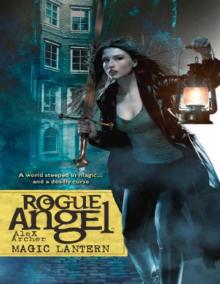 Magic Lantern (Rogue Angel)
Magic Lantern (Rogue Angel) God of Thunder
God of Thunder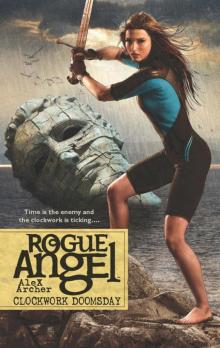 Clockwork Doomsday
Clockwork Doomsday The Bone Conjurer
The Bone Conjurer Treasure of Lima
Treasure of Lima The Soul Stealer
The Soul Stealer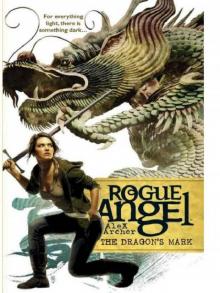 The Dragon’s Mark
The Dragon’s Mark Restless Soul
Restless Soul Rogue Angel: God Of Thunder
Rogue Angel: God Of Thunder Rogue Angel 49: The Devil's Chord
Rogue Angel 49: The Devil's Chord Death Mask
Death Mask Rogue Angel 46: Treasure of Lima
Rogue Angel 46: Treasure of Lima Swordsman's Legacy
Swordsman's Legacy The Oracle's Message
The Oracle's Message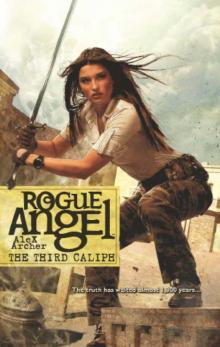 The Third Caliph
The Third Caliph Tribal Ways
Tribal Ways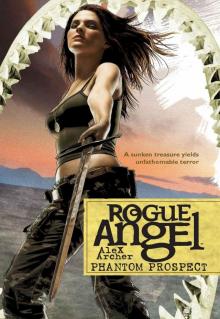 Phantom Prospect
Phantom Prospect Rogue Angel 50: Celtic Fire
Rogue Angel 50: Celtic Fire Library of Gold
Library of Gold Rogue Angel 53: Bathed in Blood
Rogue Angel 53: Bathed in Blood Sacred Ground
Sacred Ground The Devil's Chord
The Devil's Chord Serpent's Kiss
Serpent's Kiss The Vanishing Tribe
The Vanishing Tribe Sunken Pyramid
Sunken Pyramid Sunken Pyramid (Rogue Angel)
Sunken Pyramid (Rogue Angel) City of Swords
City of Swords Bathed in Blood
Bathed in Blood The Lost Scrolls
The Lost Scrolls The Babel Codex
The Babel Codex Mystic Warrior
Mystic Warrior Eternal Journey
Eternal Journey Beneath Still Waters
Beneath Still Waters Solomon's Jar
Solomon's Jar Beneath Still Waters (Rogue Angel Book 55)
Beneath Still Waters (Rogue Angel Book 55) Cradle of Solitude
Cradle of Solitude Secret of the Slaves
Secret of the Slaves River of Nightmares
River of Nightmares Polar Quest
Polar Quest False Horizon
False Horizon